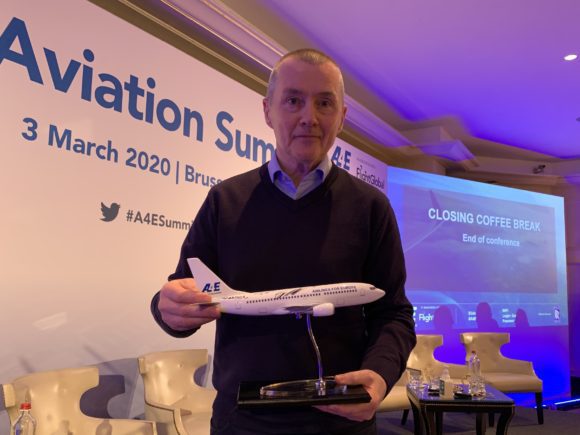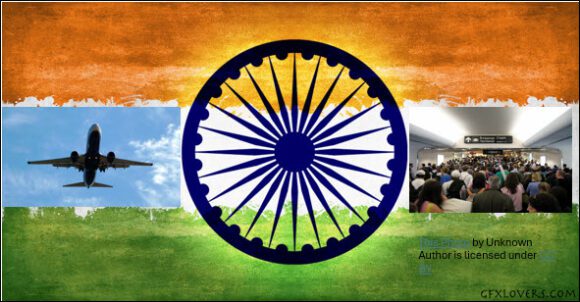e4a
Captains of Europe’s Big Five airlines are worried but not in a panic about how Covid-19 will impact the air travel industry this year. At least, that has been their message at the Airline 4 Europe (A4E) Aviation Summit in Brussels on March 3. At the same time, they expect the virus will lead to airline failures if the crisis extends for longer.
Covid-19 was very much on the table at this year’s event, not least as the media asked many questions about the subject. Participants of the event were asked not to shake hands or kiss. One of the speakers from Bergamo (Italy) decided not to travel to Brussels and was present via a video link.
Since Covid-19 appeared in China in January, there has been a huge drop in air travel to China and Asia. Asian airlines have drastically reduced capacity. Then on February 24, Covid-19 has been registered in Italy and to most other European countries as well. International Airlines Group (IAG) CEO Willie Walsh said there has been a significant fall-off in travel to Italy. “But there is a fast-moving dynamic here. It’s too early to say what this will mean. All have amended their schedules until late March”, Walsh said.
IATA asked governments to waive the so-called 80 percent rule, which requires airlines to use 80 percent of given slots or lose them the next year. With capacity down, airlines might not be able to continue to commit to this level. “It’s not unusual to have a temporary waiver”, said A4E’s Thomas Reynart. The EU’s director-general Henrik Hololei was present but not immediately positive on this proposal. Other help from governments to the airline industry is helpful too, although Ryanair’s Michael O’Leary was wary about this: “The last thing we need is government intervention. Bailing out airlines of failed airlines should be restricted. Let bankrupt airlines go bankrupt.”
O’Leary expects the slump in bookings to be short. “Bookings for the next weeks to Italy, in particular, are very deflated, but people will get bored about corona and wish to travel again. Easter is in mid-April. As of yet, we haven’t seen any devaluation of bookings. As things settle down, demand will return”, O’Leary said, reflecting the general mood of his colleagues.
Yet most airline bosses present in Brussels expect the Covid-19 crisis could lead to airline failures and further airline consolidation within Europe. O’Leary thinks the first airlines could fail “within three weeks.” Walsh said: “There are a few weak airlines out there, I can’t see how they will survive.” Finnair’s Topi Manner says: “The weak airlines will get weaker. Fortunately, we are a strong airline with enough cash and a strong balance sheet.” Finnair feels the effects especially on its network to and from Asia on which it has been pretty successful of late.
The airline manufacturers have not seen a ‘Covid-19 effect’ with airlines canceling orders. “It’s too early to say if there will be an effect on the industrial side”, said Airbus’ CCO Christian Scherer. Boeing’s Ihssane Mounir subscribed to this view and agreed that the airliner business has become more and more a non-cyclical business where airlines focus on cash preservation. He quoted last week’s 787-order by ANA: at one moment the airline is reducing capacity over the virus outbreak, at the same time it orders additional aircraft. Still, Air Asia reportedly has deferred deliveries of A330-900’s.
Willie Walsh received a 737-model signed by his A4E-colleagues. (Richard Schuurman)
Single European Sky
There were two familiar topics on the A4E agenda: Europe’s single sky and taxes. A renewed call for action by the European Commission and individual states that mimics that of earlier Aviation Summits showed little has improved over the years.
”Forty years ago I was pilot on a 737 and followed the same flightpaths as today. The airline industry had invested billions since in aircraft with the latest technology but we are forced to fly the same as forty years ago”, Walsh said. Of 67 million tonnes of carbon dioxide emitted by the airline industry in Europe in 2018, smarter air traffic management could save seven to ten million a year, Walsh said. He and others called out again to the EU to finally implement the Single European Sky-project. “How realistic is SES. It is. There is no reason why we can’t operate with it.” Lufthansa’s Carsten Spohr added: “There is a new argument in town to implement it: the environment. For governments, it is now more difficult to evade the subject.”
SES could save Europe’s airlines EUR 17.4 billion in cost savings, a study commissioned by the lobby group from ICCSA University in Bergamo claims. The study says unilateral aviation taxes have distorted the EU internal market by EUR 16.7 billion. Taxes are not the way to go if you want to induce a change in behavior, A4E says. “You need a taxation system that is linked to us being incentivized to decarbonize the industry”, said easyjet’s Johan Lundgren.
Part of this should be directed to legislative options – some made compulsory – that boost development and uptake of sustainable aviation fuels, which at just 100 tonnes a year worldwide is enough to keep Lufthansa’s fleet operational for just 36 hours. Even producing six million tonnes as IATA wants in 2025 is only a far cry from the 300 million tonnes the sector needs worldwide, Neste’s EVP Thorsten Lange said.
Right today, Dutch Transport secretary Cora van Nieuwenhuizen has proposed to her EU colleagues to make the blending of SAF’s with traditional aviation fuel compulsory in three years’ time.
Other investments and incentives should be made available for innovations as hybrid and electric engine technologies, A4E wants. While there are countless projects that try to bring aviation into this new territory, opinions differ on what is available when and for what size of aircraft. Christian Scherer thinks hybrid-electric airliners are available early next decade, Rolls-Royce Chief Technical Officer Paul Stein says “2029 should be possible”, although of only limited size.
At his last summit before retiring by the end of March, Willie Walsh was presented an aircraft model of a 737 signed by all his CEO colleagues. Asked if he wished to have a final word, Walsh quickly responded: ‘Goodbye’.
Views: 2




